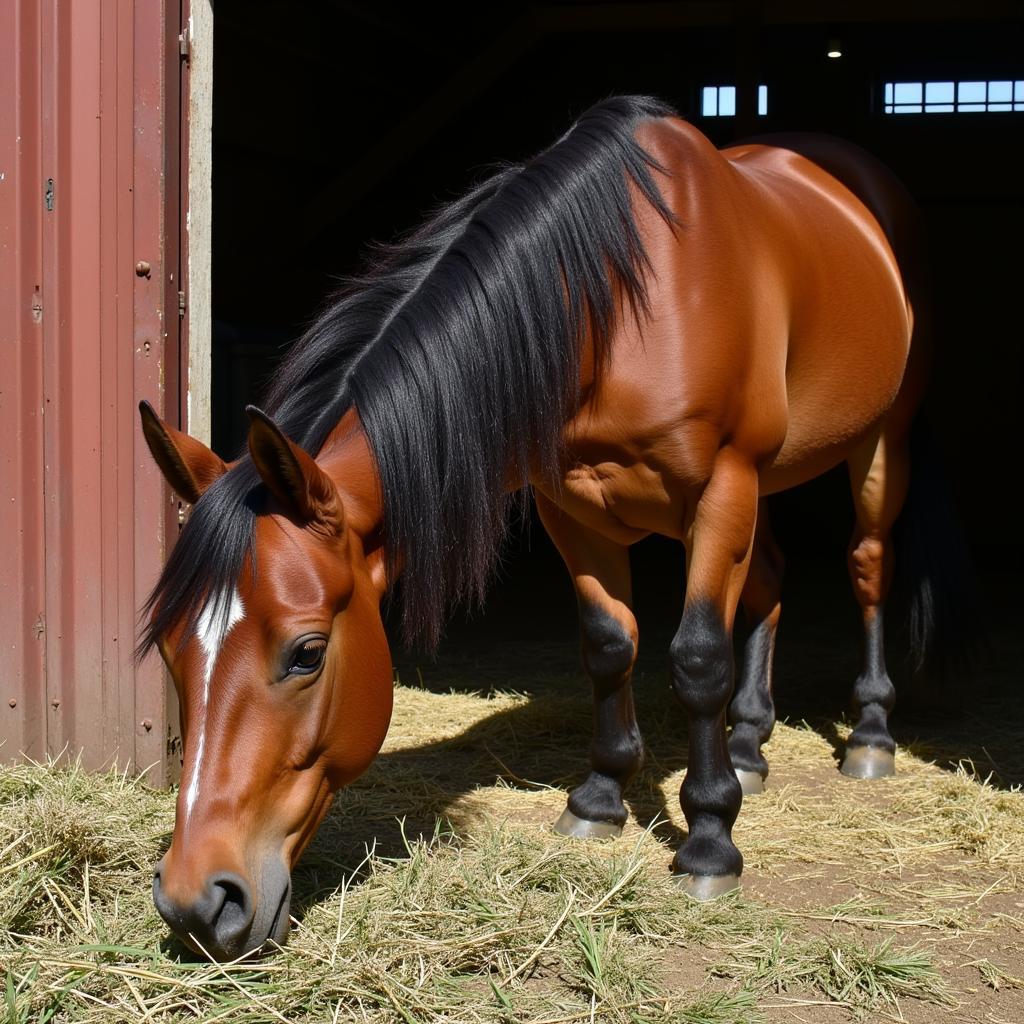Knowing how much horse food costs is essential for any horse owner. Whether you’re a seasoned equestrian or a first-time horse owner, understanding the financial commitment of keeping your horse healthy and well-fed is paramount. This comprehensive guide will delve into the factors influencing horse food costs and provide valuable insights into providing optimal nutrition while managing your budget effectively.
 A horse eating hay from a stable
A horse eating hay from a stable
Factors Affecting Horse Food Costs
Several factors come into play when determining the cost of feeding your horse. These include:
-
Type of Feed: Just like humans, horses need a varied diet. The most basic and essential component is hay, which can range from affordable options like grass hay to more expensive choices like alfalfa hay. Concentrates such as oats, barley, and commercially prepared horse feed come with varying price tags depending on the brand, ingredients, and nutritional value.
-
Horse’s Age and Activity Level: A young, growing horse or a performance horse engaged in rigorous activity will have higher nutritional demands than a sedentary, mature horse. Consequently, their feed will likely be more expensive as it needs to be nutrient-dense to support their needs.
-
Location and Availability: Geographical location and seasonal fluctuations can significantly impact feed prices. Areas with limited access to certain types of hay or grains may experience higher prices due to transportation costs.
Types of Horse Feed and Their Costs
Hay:
- Grass Hay: $4 – $12 per bale (average 50 lbs)
- Alfalfa Hay: $10 – $25 per bale (average 50 lbs)
- Timothy Hay: $8 – $20 per bale (average 50 lbs)
Concentrates:
- Oats: $10 – $20 per bushel (48 lbs)
- Barley: $8 – $18 per bushel (48 lbs)
- Corn: $6 – $15 per bushel (56 lbs)
Commercially Prepared Horse Feed:
- Sweet Feed: $15 – $30 per bag (50 lbs)
- Pelleted Feed: $20 – $40 per bag (50 lbs)
- Senior Horse Feed: $25 – $45 per bag (50 lbs)
Supplements:
- Salt Blocks: $5 – $15 per block
- Mineral Supplements: $10 – $30 per month
- Joint Supplements: $30 – $60 per month
Please note: These prices are approximate and may vary significantly depending on your location, supplier, and the time of year.
Tips for Managing Horse Food Costs
Feeding your horse doesn’t have to break the bank. Here are some practical tips to help you manage costs without compromising your horse’s nutrition:
- Buy Hay in Bulk: Purchasing hay during its peak season or joining forces with other horse owners for a bulk discount can lead to significant savings.
- Consider Alternative Feed Sources: Explore locally sourced feed options or connect with other horse owners to see if you can share resources and reduce transportation costs.
- Proper Storage is Key: Investing in proper storage solutions for hay and grain can minimize waste due to spoilage, ultimately saving you money in the long run.
- Monitor Your Horse’s Weight: Regularly assess your horse’s body condition and adjust their feed intake accordingly. Overfeeding can lead to unnecessary expense and potential health problems.
- Consult with an Equine Nutritionist: An equine nutritionist can help you develop a balanced and cost-effective feeding plan tailored to your horse’s specific needs.
 A horse owner inspecting the quality of hay.
A horse owner inspecting the quality of hay.
Frequently Asked Questions about Horse Food Costs
Q: How much does it cost to feed a horse per month?
A: The average cost to feed a horse per month can range from $150 to $500 or more depending on the factors discussed above.
Q: Can I feed my horse cheaper alternatives to traditional horse feed?
A: While it’s essential to consult with your veterinarian before making any significant dietary changes, incorporating cheaper alternatives like beet pulp or alfalfa cubes into your horse’s diet can help reduce costs.
Q: Is it cheaper to buy horse feed online or in stores?
A: Both online and in-store retailers offer competitive prices on horse feed. Comparing prices and considering factors like shipping costs and convenience will help you determine the most cost-effective option.
Conclusion
Providing adequate nutrition is crucial for your horse’s well-being. By understanding the factors influencing horse food costs and adopting some savvy budgeting strategies, you can keep your equine companion happy and healthy without overspending. Remember to prioritize quality, consult with professionals, and always observe your horse for any signs of dietary deficiencies or health issues.
Need help figuring out the best and most cost-effective way to feed your horse? Contact us at Mina Cones Food – Phone Number: 02437655121, Email: minacones@gmail.com or visit us at 3PGH+8R9, ĐT70A, thôn Trung, Bắc Từ Liêm, Hà Nội, Việt Nam. Our 24/7 customer service team is here to assist you!